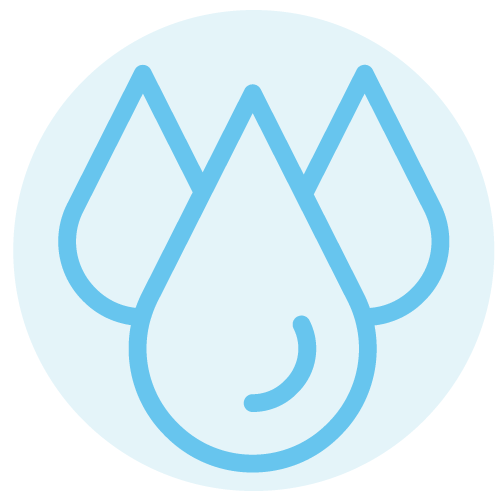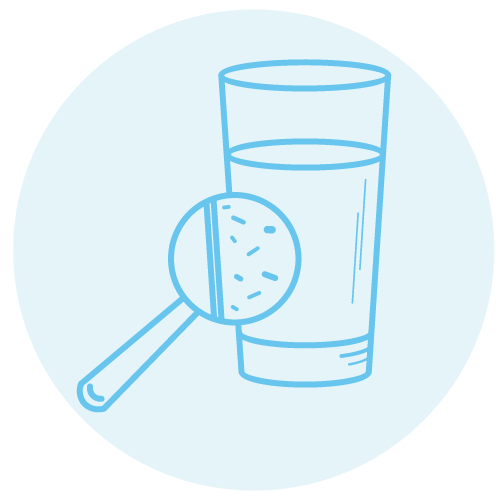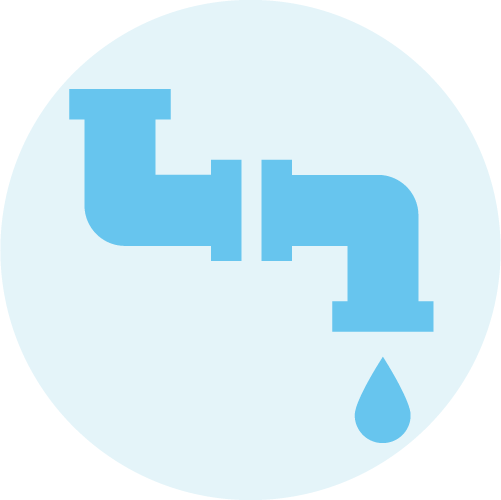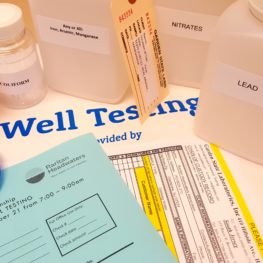| Test |
Fee |
Reasons to Test |
Possible Sources |
| Basic: Total Coliform & Fecal Confirmation, Nitrates |
$70 |
Test every year. Cloudy water and/or recurrent gastrointestinal complaints from people drinking water. High levels of nitrates are harmful to infants and pregnant women |
Cracks in well casing, faulty seal or seepage near well — septic system problems — stormwater runoff — seepage from fertilized land |
| Iron/Manganese |
$45 |
Discoloration of laundry or plumbing fixtures, rust stains and/or bitter or metallic taste |
Naturally occurring deposits — industrial wastes |
| Per- and Polyfluoroalkyl Substances (PFAS)
Includes new EPA ruling compounds: PFOA, PFNA, PFOS, PFHxS, HFPO-DA, PFBS |
$295 |
Increased risk of some cancers including prostate, kidney, and testicular cancers, decreases in fertility or increases in high blood pressure in pregnant women, reduced ability of the body’s immune system to fight infections including reduced vaccine response, child development effects including low birth weight, accelerated puberty, bone variations, or behavioral changes, interference with the body’s natural hormones, increased cholesterol levels and/or risk of obesity |
PFAS-containing products (certain firefighting foams, non-stick cookware, stain-resistant carpets and furniture, water-resistant clothing, heat-resistant paper/cardboard food packaging, some personal care products), landfills, land applied sludge |
| Lead |
$30 |
Harmful to pregnant women and children. Can cause physical or mental development problems in infants or children and kidney problems or high blood pressure in adults |
Corrosion of household pipes, fittings and/or solder (soft water may be more corrosive than hard water) |
| Arsenic |
$35 |
Can cause increased risk of cancers, gastrointestinal ailments, diabetes and cardiovascular impacts |
Naturally occurring deposits — wood preservatives |
| Volatile Organic Compounds (32 chemicals) |
$115 |
High levels can cause liver, nervous system disorders, irregular heartbeat, high blood pressure, anemia and cancer |
Underground storage tanks — Gas stations — landfills — hazardous waste sites — septic systems |
| Copper |
$25 |
Testing recommended if you are experiencing symptoms High levels can cause vomiting, diarrhea and stomach cramps/nausea. Long term exposure can cause anemia and disrupt liver and kidney function. Discoloration/blue-green stains of plumbing fixtures. |
Corrosion of household pipes and fittings. Soft water may be more corrosive. |
| Radon |
$65 |
Can be ingested or inhaled as gases are released from the water into the air. Exposure to radon in drinking water can lead to lung cancer |
Naturally occurring, produced by the breakdown of uranium in soil, rock and water. Can enter the home through well water |
| Gross Alpha |
$85 |
Test at least once. Gross Alpha is a screen for uranium and radium. Can be ingested, or inhaled as gases that are released from the water into the air. Exposure to gross alpha emitters in drinking water can lead to lung cancer |
Erosion of natural deposits of minerals that are radioactive — may emit alpha radiation, which can enter the home through well water |




 80% of the households in our region depend upon private wells for drinking water. The US Environmental Protection Agency recommends that household water be tested once a year to ensure the well is free from harmful bacteria and nitrates. Testing can be expensive, but RHA has established a program that provides residents of the Raritan Headwaters region water tests by a state-certified lab at reasonable rates. Information is not shared with any party other than the homeowner and results data can be used to assess groundwater quality in our area. Local Health Departments, the Environmental Protection Agency and the Center for Disease Control all recommend that private well owners test their drinking water annually for bacteria, nitrates, and any other contaminants that are known to be of local concern. Like annual preventative health screenings, an annual well test for bacteria and nitrates is an important part of maintaining good health.
80% of the households in our region depend upon private wells for drinking water. The US Environmental Protection Agency recommends that household water be tested once a year to ensure the well is free from harmful bacteria and nitrates. Testing can be expensive, but RHA has established a program that provides residents of the Raritan Headwaters region water tests by a state-certified lab at reasonable rates. Information is not shared with any party other than the homeowner and results data can be used to assess groundwater quality in our area. Local Health Departments, the Environmental Protection Agency and the Center for Disease Control all recommend that private well owners test their drinking water annually for bacteria, nitrates, and any other contaminants that are known to be of local concern. Like annual preventative health screenings, an annual well test for bacteria and nitrates is an important part of maintaining good health.